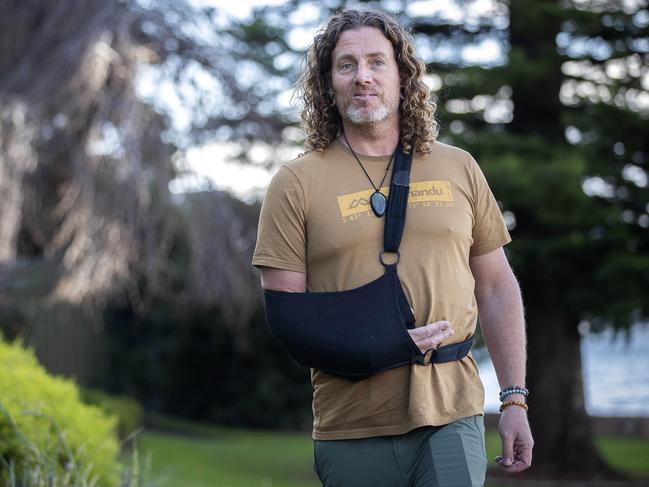‘I thought I was one of the good guys up until that point’: Soldier explains trauma on witnessing horrors in Afghanistan
A soldier who was deployed to Afghanistan has explained how he was left a “broken man” after seeing horrors that were explained away by his superiors.
Police & Courts
Don't miss out on the headlines from Police & Courts. Followed categories will be added to My News.
WHEN Gavin Tunstall first joined the Army, he felt like he was part of a family – and that he had some purpose to his life.
But the horrors he saw while he was deployed to Afghanistan, and the way his superiors explained it away, left him a “broken man”.
The 44-year-old, giving evidence on Thursday in Hobart before the Royal Commission into Defence and Veteran Suicide, explained how he came across the bodies of two deceased children while sweeping an area for mines.
“I would say they were around 10 years old, 12 years old. One was still behind the machine gun and one was in a position where he was feeding in ammunition,” the former combat engineer said.
“It’s not usual for children to be fighting, it’s not usual for children to fire a machine gun. It is not usual for me to be inspecting their dead bodies. I expected men.”
Mr Tunstall said his commanding officer told him he’d only seen one deceased child – and a “fighting-age male”.
“He explained that in their country, children are blooded as warriors at an early age and part of that is to kill soldiers from the opposite side.”
Mr Tunstall said his mental health started to unravel after that.
“I started lying about my experience in Afghanistan because the way I felt they were trying to explain something way had now made me ashamed of what I had been involved in,” he said.
“I thought I was one of the good guys up until that point.”
He said he didn’t believe anyone could be prepared psychologically for what they’d see at war.
“You can’t be trained for that,” he said.
“We were made fit, we went to the gym, we ate lots of food, we lifted weights, we did exercises, we were ready for war. We knew how to use our equipment but the psychological stuff … I just really don’t know how much you can prep psychologically for something you’ve never seen before.”

Upon his second deployment to Afghanistan, Mr Tunstall said his mental health condition – plus three serious physical injuries he’d sustained – meant his classification was downgraded.
He said a stigma was soon attached to him.
“It turns you into what is called a lingerer,” he said.
“You should be hard enough to continue, and if you don’t continue, you are too soft and you need to leave.”
Returning home, his world back in Australia started to fall apart – losing his family, undergoing financial hardship, developing suicidal ideation, and being served his Army termination papers while he was in a psychiatric unit.
“Bad dreams, night terrors started, I started locking myself away in my room, started isolating myself away from my friends, and no tolerance of any noise,” he said.
He said he lost his career – of which he’d been proud – and became a single man, with little contact with his wife or children after an alleged domestic violence incident when he was taken suddenly off his medication by a “negligent” psychiatrist.
“I struggle every day with the pain of my physical injuries and the mental anguish of my service. My life will never be the same again.”
Mr Tunstall, who lives in NSW but has family in Tasmania and spent a lot of time on the island while growing up, said once he was accused of domestic violence, all support from the Army simply dried up.
By the time he was finally compensated by the Army – some three years after his discharge – his family was gone.
He said he wanted to speak publicly on behalf of his colleagues who had died by suicide, and for the families of veterans who suffered.
“I want to help. I was a veteran in the dark and I’m now starting to get out of it,” he said.
“My family pretty much lost their provider. My kids lost their dad. My wife lost her husband.
“We were meant to be together until we were old, and that’s been taken away.”
The royal commission hearing in Hobart is continuing.
For help in a crisis, please contact:
Lifeline: 24-hour support line: 13 11 14
Nightly text line: 0477 131 114
Suicide call back service: 1300 659 467 (24-hour counselling service for suicide prevention and mental health)





